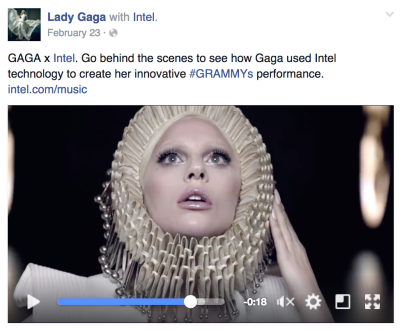Facebook To Collect Brand-Sponsored Content Data
An announcement late last week by the Facebook media team may have been overlooked by many marketers, but it has intriguing ramifications.
Facebook announced that it would effectively allow any organization with a verified page to publish brand-sponsored content without asking Facebook for explicit permission first, provided that content was tagged to the brand. They said:
Today we're updating our branded content policy to enable verified Pages to share branded content on Facebook. Along with changes to our branded content policy and ads policy, we're offering a new tool that makes it easy for publishers and influencers to tag a marketer when they publish branded content. Publishers and influencers must use this tag for all branded content shared on Facebook.

What does it mean?
- Facebook's going to have lots and lots of data on which publishers work with which brands and how that content performs across Facebook. This 'new tool' is at the very least a passive instrument (clocking events), with the opportunity to turn it into an active program (reporting and optimizing events). MarketingLand moots the idea that Facebook may in future ask for a cut of that relationship, which seems unlikely; why would Facebook double tax in a way that potentially supressed creation and thus, as a knock-on effect, suppressed the content's distribution, which is where Facebook is playing? Rather, Facebook would want to use the data to encourage more partnerships.
- Facebook's now explicitly in the influencer management game. Facebook tells marketers 'the new tool will introduce more transparency and allow them to better understand how their marketing initiatives are performing across Facebook.' The efforts around measuring and managing brands' engagements with hundreds of influencers are now the domain of either PR and digital agencies or specific technologies like Linqia, TapInfluence, Upfluence, Traackr, or Onalytica. Facebook doesn't replace those; it does, however, introduce a compelling offer to sit alongside them.
- Facebook's saying, between the lines, that this sponsored content thing is getting to be a big deal. The tagging of brands in sponsored content posted by publishers or influencers was, according to earlier Facebook policy, subject to explicit approval and consent by Facebook. This, I can only imagine, was honored more in the breach. Facebook naturally concluded, as these plays became part of a growing trend: Why not simply provide a little more structured data around this, and think about where to use that data?
- Facebook's going to have data to help publishers make compelling arguments to brands. A natural extension of this kind of data would seem to be for the likes of publishers and influencers, to differentiate their native content offerings. Already, many of them are selling branded content plays, of which one leg is sponsored social promotion; now, with data from Facebook, these publishers can benchmark the added visibility and even lift that they provide against specific audiences.
